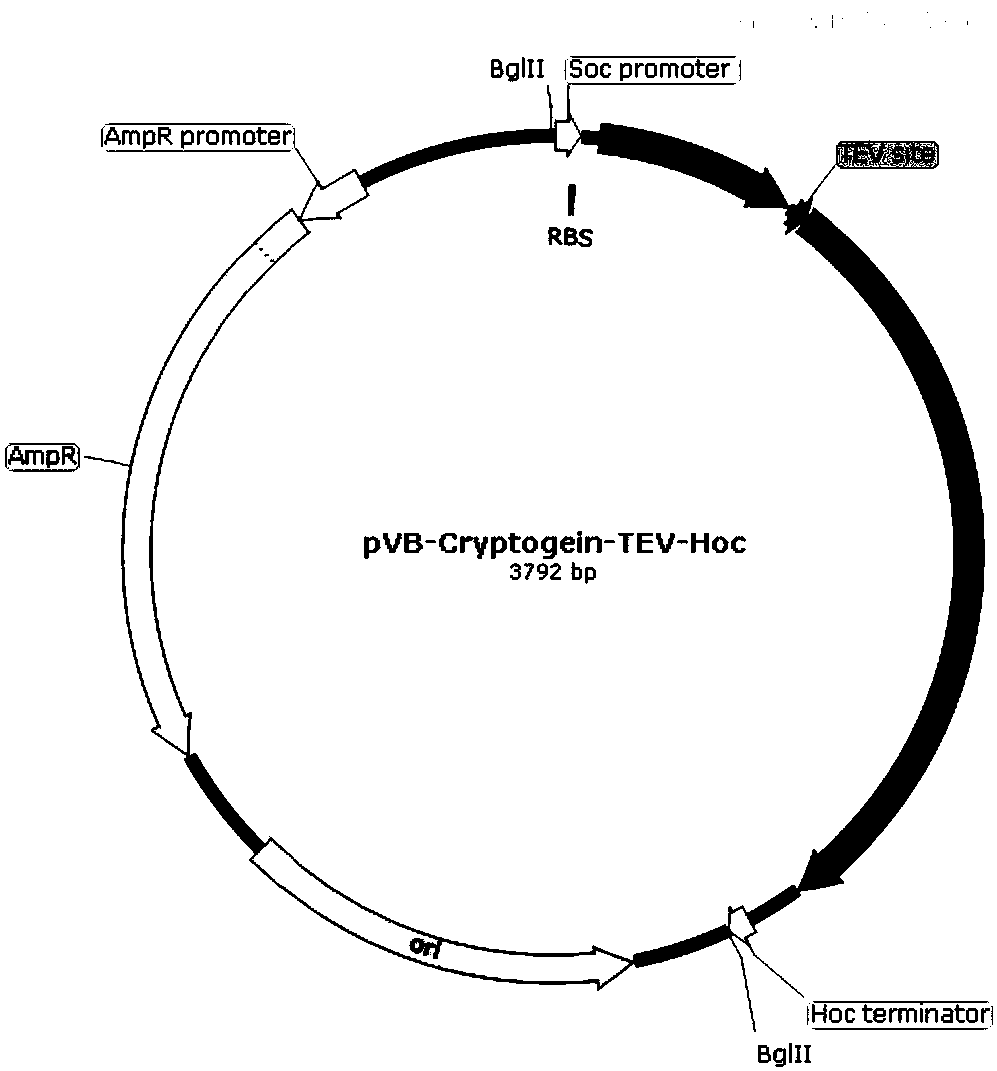Preparation method of high-purity cryptogein
A high-purity cryptid protein technology, which is applied in the field of preparation of high-purity cryptic protein, can solve the problems of reducing the yield of microbial proteins and polypeptides, reducing biological activity and stability, and lengthy processes, and achieves good practical application value, Easy to accept and simplify the effect of purification process
- Summary
- Abstract
- Description
- Claims
- Application Information
AI Technical Summary
Problems solved by technology
Method used
Image
Examples
preparation example Construction
[0038] A first aspect of the present invention provides a method for preparing high-purity cryptoprotein, the steps comprising:
[0039] S1, connect the coding gene of cryptin with TEV protease and T4 bacteriophage Hoc protein gene fragments in turn to prepare a Cryptogein-TEV-Hoc fusion recombinant protein coding gene, the coding region of the cryptin is in the TEV-Hoc fusion protein gene. upstream, and the expression frame is consistent; the upstream of the coding DNA sequence of the Cryptogein-TEV-Hoc fusion recombinant protein is a Soc promoter sequence, and a Hoc terminator sequence is introduced downstream. In one embodiment of the present invention, the cryptin is derived from Chain A of the Cryptogein protein of the strain Phytophthora cryptogea whose GeneBank number is CAA84224.1.
[0040] S2, the encoding gene of described Cryptogein-TEV-Hoc fusion recombinant protein is transferred into plasmid;
[0041] S3, the plasmid obtained in step S2 is transferred into the E...
Embodiment 1
[0050] Example 1. Sequence acquisition of Cryptogein
[0051] The sequence encoding the Cryptogein protein derived from the strain Phytophthora cryptogea has been published (GeneBank Accession: CAA84224.1). The Cryptogein gene can be obtained by using techniques known in the industry, such as gene synthesis, PCR amplification, extraction of chromosomal DNA and establishment of a library. The present invention adopts the gene synthesis method to send the Cryptogein amino acid sequence for synthesis (Suzhou Jinweizhi Biotechnology Co., Ltd., China).
Embodiment 2
[0052] Example 2. Construction of pVB-Cryptogein-TEV-Hoc plasmid
[0053] The backbone of the plasmid was derived from the pUC18 plasmid. Using the pUC18 plasmid as a template, the ampicillin resistance gene and plasmid replication region were amplified by PCR using KOD high-fidelity DNA polymerase. The PCR forward primer was 18 bases in the upstream sequence of the ampicillin resistance gene of pUC18, and the reverse primer was the 18 bases reverse complementary sequence in the downstream sequence of the pUC18 plasmid replication region. BglII restriction sites were added to the 5' ends of the forward and reverse primers. At the same time, we used T4 phage DNA as a template and used specific primers to amplify the Hoc protein gene fragment by PCR. The 5' end of the forward primer introduced the gene sequence of TEV protease. Then, the synthesized Cryptogein protein gene fragment and the TEV-Hoc protein gene fragment were fused into a DNA molecule by bridge PCR, wherein the ...
PUM
 Login to View More
Login to View More Abstract
Description
Claims
Application Information
 Login to View More
Login to View More - R&D Engineer
- R&D Manager
- IP Professional
- Industry Leading Data Capabilities
- Powerful AI technology
- Patent DNA Extraction
Browse by: Latest US Patents, China's latest patents, Technical Efficacy Thesaurus, Application Domain, Technology Topic, Popular Technical Reports.
© 2024 PatSnap. All rights reserved.Legal|Privacy policy|Modern Slavery Act Transparency Statement|Sitemap|About US| Contact US: help@patsnap.com










